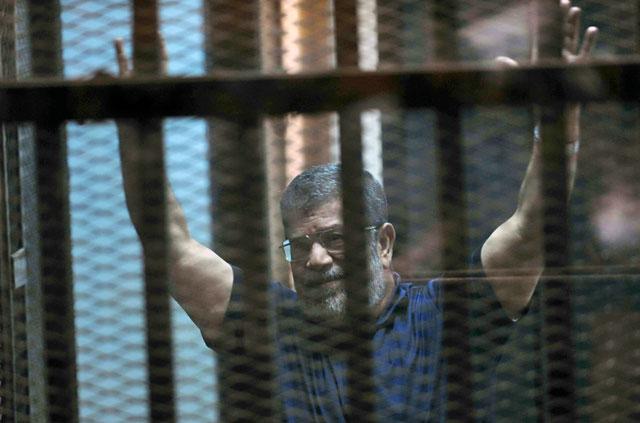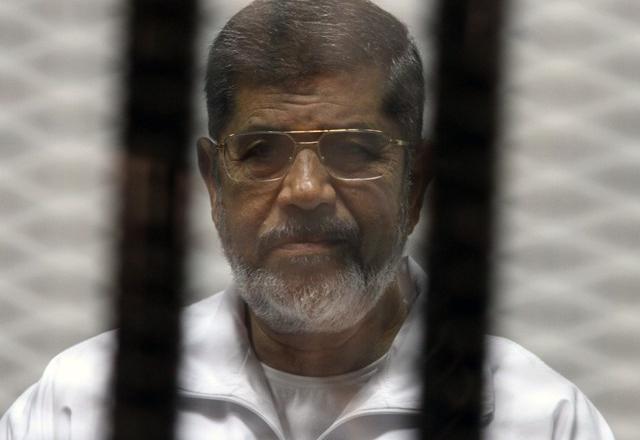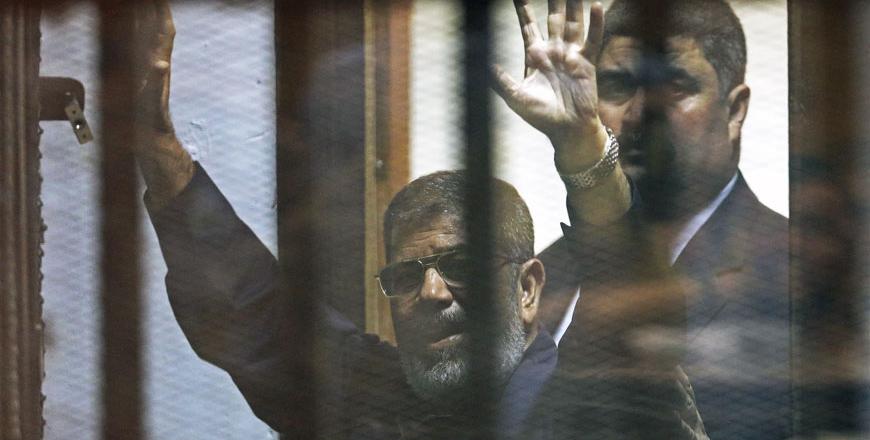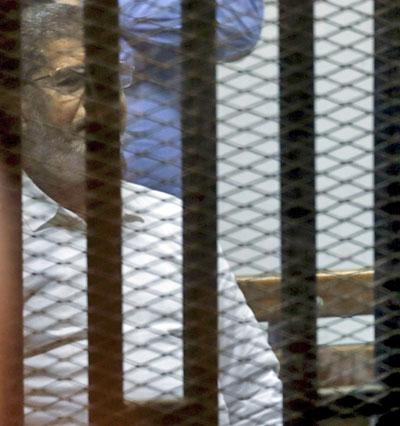You are here
Ousted Egyptian president Mohamed Morsi sentenced to death
By AP - May 16,2015 - Last updated at May 16,2015

CAIRO — An Egyptian court sentenced ousted president Mohamed Morsi and over 100 others to death Saturday over a mass prison break during the 2011 uprising that toppled Hosni Mubarak and later brought Morsi's Islamist movement to power.
In what appears to be the first violent response to the sentence, suspected Islamic militants in Egypt's Sinai Peninsula gunned down three judges and their driver, who were travelling in a car in the northern Sinai city of Al Arish, according to security officials, who spoke on condition of anonymity because they were not authorised to speak to the media.
As is customary in capital punishment cases, Judge Shaaban El Shami referred his death sentence on Morsi and the others to the nation's top Muslim theologian, or mufti, for his nonbinding opinion. Shami set June 2 for the next hearing. Regardless of the mufti's ruling, the sentences can be appealed.
Morsi, Egypt’s first freely elected leader, was ousted by the military in July 2013 following days of mass street protests by Egyptians demanding that he be removed because of his divisive policies. Morsi’s successor, Abdel Fattah Al Sisi, was the military chief at the time and led the ouster. Sisi ran for president last year and won in a landslide.
Also sentenced to death with Morsi in the prison break case were 105 defendants, most tried and convicted in absentia. They include some 70 Palestinians. Those tried in absentia in Egypt receive automatic retrials once they are detained.
Supporters of Morsi and his now-outlawed Muslim Brotherhood chanted “down, down with military rule” as Al Shami announced the verdict in the courtroom, a converted lecture hall in the national police academy in an eastern Cairo suburb.
Prosecutors alleged that armed members of the Palestinian Hamas group entered Egypt during the 18-day uprising through illegal tunnels running under the Gaza border with Egypt’s Sinai Peninsula. Taking advantage of the turmoil, the militants fought their way into several prisons, releasing Morsi, more than 30 other Brotherhood leaders and some 20,000 inmates, prosecutors say. Several prison guards were killed and parts of the stormed prisons were damaged.
Those sentenced to death with Morsi on Saturday include the Brotherhood’s spiritual leader, Mohammed Badie, as well as one of the Arab world’s best known Islamic scholars, the Qatar-based Youssef Al Qaradawi.
In Gaza, Hamas spokesman Sami Abu Zuhri said the sentencing to death of some 70 Palestinians in the prison break case was “regrettable” and “shocking”, adding that “some of those convicted were killed before the Egyptian revolution and others are serving prison terms in Israel”.
Hizbollah and Hamas operatives who had been convicted and sentenced to jail terms over terror-related charges were also broken out of jail in 2011. Hundreds of protesters were killed during the uprising and dozens of police stations across the country were stormed by demonstrators. Pro-government media maintain that the jailbreaks and the attacks on police stations were part of a Brotherhood plot to spread fear and chaos to ensure the fall of Mubarak.
The Brotherhood went on to win every election held in Egypt between 2011 and Morsi’s ouster in July 2013. Its popularity began to slide after Morsi took office in June 2012 and decreed himself above any sort of oversight later that year. Critics increasingly charged him with working for the Brotherhood and its supporters, not all Egyptians. Morsi’s supporters say he was undermined from the beginning by Mubarak-era holdovers in the security forces and other state institutions.
Hamas is the Palestinian chapter of the Brotherhood and its leaders enjoyed close relations with Morsi during his year in office. It has consistently denied meddling in Egypt’s affairs, including participating in the 2011 mass prison break, but relations between the group and the post-Morsi government in Cairo have been tense. Egypt frequently accuses Hamas of being behind some of the attacks staged by Islamic militants in northern Sinai since Morsi’s ouster.
An Islamist insurgency has been simmering in northern Sinai for years, but it intensified after Morsi’s ouster, leading the government to associate it with the Brotherhood. The militants have mostly targeted security and military personnel in Sinai and elsewhere as well as planting small, homemade devices in Cairo and other cities to disrupt life and curtail services, like electricity and transport. Targeting judges, however, is new.
Judge Moataz Khafagi, who presides over the trial of several Muslim Brotherhood leaders on criminal charges, escaped an assassination attempt when an explosive device went off outside his home in a southern Cairo suburb. The blast damaged several cars but caused no casualties.
Turkish President Recep Tayyip Erdogan criticised Morsi’s death sentence, saying the government was returning to the “old Egypt” by rolling back democracy. He also criticised the West, saying it had failed to speak out against Sisi or death sentences being handed down to Brotherhood leaders. Egypt under Morsi enjoyed close ties with Turkey. Sisi’s government has often accuses Ankara of meddling in Egypt’s affairs.
Amr Darrag, a Cabinet minister under Morsi and a co-founder of the Brotherhood’s Freedom and Justice Party, condemned Saturday’s verdicts.
“Today will be remembered as one of the darkest days in Egypt’s history,” Darrag said in a statement. But “there is something far larger at stake — the rights of millions of Egyptians to live freely and without fear, and to choose their leaders through the ballot box.”
An Islamist opposition alliance led by the Brotherhood meanwhile called on Egyptians to step up the campaign to topple the “gang of treachery and usurpers” in the run-up to July 3, the second anniversary of Morsi’s removal from power.
Amnesty International also denounced the verdicts, which came after several mass death sentences criticised by human rights activists and Western nations. It called for a retrial, asserting that all evidence gathered from Morsi and other defendants was inadmissible because of what it called their illegal detention prior to trial.
“The death penalty has become the favorite tool for the Egyptian authorities to purge the political opposition,” Amnesty said.
Morsi already is serving a 20-year sentence following his conviction on April 21 on charges linked to the killing of protesters outside a Cairo presidential palace in December 2012.
The former president escaped a death sentence in a separate case before Shami related to allegations that Morsi, several of his aides and leaders of the Brotherhood allegedly passed state secrets to foreign groups, including Hamas and Lebanon’s Hizbollah, during his year in office. A total of 16 senior Brotherhood leaders and aides were sentenced to death by Shami in that case. The 16 include one woman, Sondos Assem, a presidential press aide who is now a fugitive.
A verdict on Morsi’s role in that case will be announced in the June 2 hearing.
Related Articles
An Egyptian court on Saturday sentenced ousted President Mohamed Morsi to death over his part in a mass prison break that took place during the 2011 uprising that toppled Hosni Mubarak.
CAIRO — An Egyptian court sentenced deposed President Mohamed Morsi to death on Tuesday over a mass jail break during the country's 2011 upr
Muslim Brotherhood leader Mohamed Morsi was sentenced to 20 years in prison without parole on Tuesday on charges arising from the killing of protesters, nearly three years after he became Egypt's first freely elected president.



















